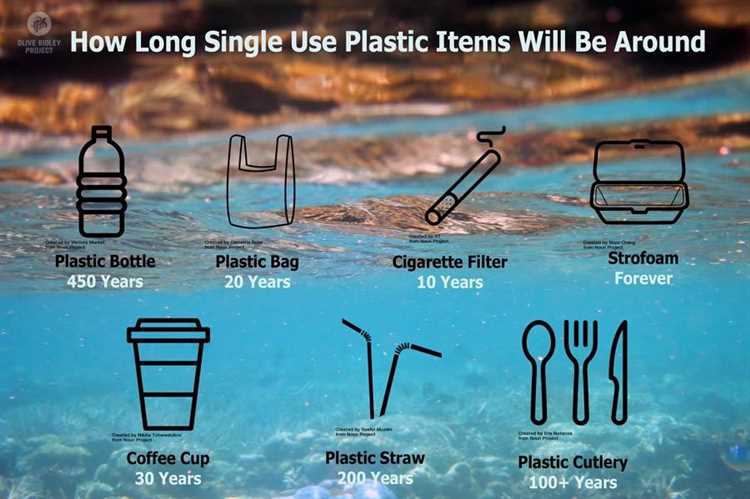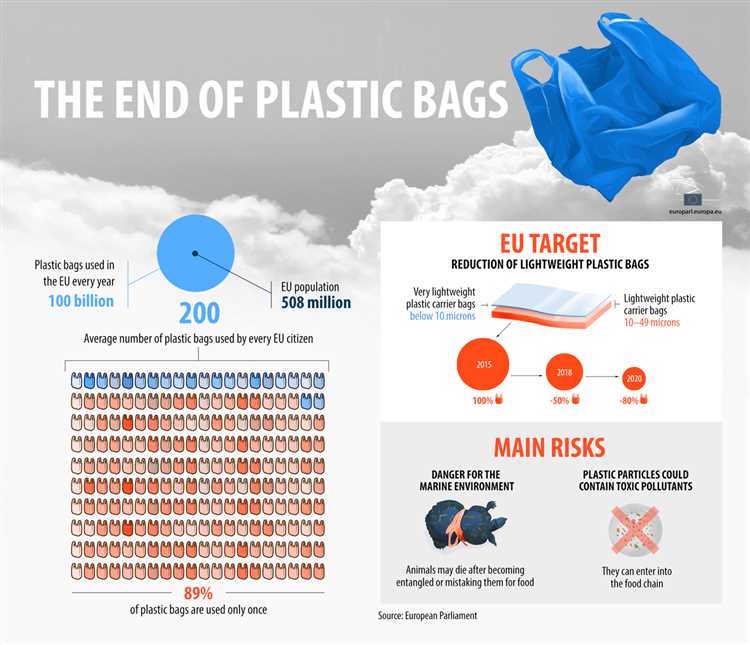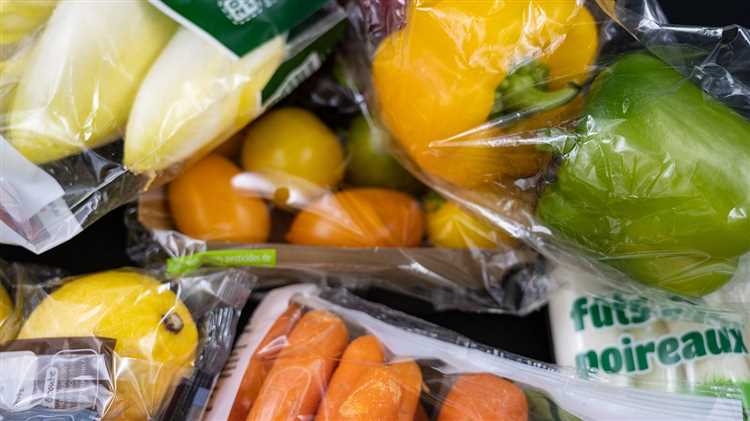France’s ban on plastic bags has been a significant step towards reducing plastic waste and protecting the environment. Plastic bags have long been a major contributor to pollution and have detrimental effects on wildlife and ecosystems. This ban has not only forced people to find alternative solutions, but it has also raised awareness about the importance of sustainability and the need for responsible consumption.
The ban on plastic bags in France began on July 1, 2016. This marked a historic moment as France became the first country in the world to implement a nationwide ban. The ban applied to all single-use plastic bags, including those provided by retailers, and aimed to encourage people to switch to reusable bags.
The ban was a culmination of efforts to reduce plastic waste in France. Prior to the ban, several cities and regions in France had already implemented their own restrictions on plastic bags, but this national ban meant a harmonized approach across the country. It was estimated that around 17 billion plastic bags were used in France each year before the ban, and this number was expected to decrease significantly as a result.
The ban was met with mixed reactions and faced some initial challenges. Some people were supportive of the ban, seeing it as a necessary step to protect the environment. However, others were skeptical and believed it would inconvenience consumers. To address these concerns, the French government launched awareness campaigns and provided information about alternatives to plastic bags, such as reusable bags, paper bags, or biodegradable bags.
- Beginning of the Movement
- 2002
- 2007
- The Implementation of the Ban
- Phase 1: Pilot Programs (2015-2016)
- Phase 2: Full Implementation (2016)
- Impact on Plastic Bag Usage
- 1. Behavioral Shift
- 2. Increased Awareness
- 3. Adoption of Alternatives
- Successes and Challenges
- Future Steps and Global Influence
- Expanding the Ban
- Global Influence
- Question-answer:
- When did France ban plastic bags?
- Why did France ban plastic bags?
- What are the penalties for using plastic bags in France?
- What are the alternatives to plastic bags in France?
- Has the plastic bag ban been successful in France?
Beginning of the Movement
In the early 2000s, concerns about the environmental impact of plastic bags began to grow, leading to a movement for their ban. France was one of the first countries to take action, recognizing the need to reduce plastic waste and protect the environment.
2002
The movement gained momentum in 2002 when France passed a law requiring supermarkets to charge customers for plastic bags as a way to discourage their use. This small step towards reducing plastic bag consumption was a significant first in the fight for sustainability.
2007
Several years later, in 2007, France took a more significant step by banning non-biodegradable plastic bags altogether. This ban applied to all retailers, not just supermarkets, and aimed to reduce the number of plastic bags ending up in landfills and polluting the environment.
This move was met with mixed reactions. Some praised the government for taking action to protect the environment, while others criticized the ban for inconveniencing consumers. However, it marked a significant milestone in the global movement against plastic pollution.
The Implementation of the Ban
France’s ban on plastic bags was implemented in several phases in order to give businesses and consumers time to adjust to the new regulations.
Phase 1: Pilot Programs (2015-2016)
The ban was first introduced in 2015 as a pilot program in several French cities. During this phase, selected businesses were required to stop offering plastic bags to customers and instead provide alternatives such as paper or reusable bags. The pilot programs helped to identify any potential challenges or issues that may arise during the ban’s full implementation.
Phase 2: Full Implementation (2016)
In 2016, the ban on plastic bags was expanded nationwide. All businesses in France were now required to comply with the ban and stop using plastic bags. The government provided guidelines and assistance to businesses during this transition period to help them find suitable alternatives and make the necessary adjustments to their operations.
During the full implementation phase, consumers were encouraged to bring their own bags when shopping and to make use of reusable bags. Additionally, the ban also applied to other types of plastic bags, such as those used for fruits and vegetables in grocery stores.
The implementation of the ban was supported by a public awareness campaign that highlighted the environmental impact of plastic bags and the benefits of using alternatives. The campaign aimed to educate and inform the public about the ban and encourage behavior change.
Overall, the ban on plastic bags in France was successfully implemented, resulting in a significant reduction in plastic bag usage and a positive impact on the environment. The ban served as a model for other countries around the world looking to address the issue of plastic pollution.
Impact on Plastic Bag Usage
The ban on plastic bags in France has had a significant impact on the country’s plastic bag usage. Since the implementation of the ban, there has been a noticeable decrease in the number of plastic bags being used by consumers. This can be attributed to several factors.
1. Behavioral Shift
The ban has resulted in a shift in consumer behavior, with people becoming more conscious of their plastic bag usage. Many consumers have started opting for reusable bags or bringing their own bags when shopping, leading to a decrease in the demand for plastic bags.
2. Increased Awareness

The ban has also raised awareness about the environmental impact of plastic bags. People have become more educated about the negative effects of plastic bags on the environment, such as pollution and harm to wildlife. This increased awareness has motivated individuals to reduce their plastic bag usage and find alternative solutions.
In addition to these behavioral changes, the ban has also led to some practical changes in the retail industry.
3. Adoption of Alternatives
Retailers have been forced to find alternative solutions to plastic bags since the ban. Many businesses have started offering biodegradable or reusable bags as an alternative to single-use plastic bags. Some retailers have also implemented bulk bin sections and encouraged customers to bring their own containers, further reducing the need for plastic bags.
Overall, the ban on plastic bags in France has had a positive impact on plastic bag usage. It has fostered a shift in consumer behavior, increased awareness about the environmental impact of plastic bags, and driven the adoption of alternative solutions in the retail industry. These changes are crucial for reducing plastic waste and protecting the environment.
Successes and Challenges

The ban on plastic bags in France has been largely successful in reducing plastic waste and promoting the use of reusable bags. Since its implementation, there has been a significant decrease in the number of plastic bags distributed by retailers across the country.
One of the major successes of the ban is the change in consumer behavior. The French population has shown a willingness to adapt to the new regulations and make use of alternative options such as reusable bags. This shift in mindset has led to a decrease in plastic bag usage and a greater awareness of the environmental impact of single-use plastics.
Another key success has been the positive impact on the environment. The ban has helped to reduce litter and plastic pollution, particularly in coastal areas where plastic bags were often found washed up on beaches. This has improved the overall aesthetic of public spaces and protected wildlife that can be harmed by ingesting or becoming tangled in plastic.
However, the ban on plastic bags has not been without its challenges. One of the main challenges has been the lack of alternative options for certain industries and product types. Certain items, such as fresh produce, are still commonly packaged in plastic bags due to their specific requirements for hygiene and product visibility. Finding suitable alternatives that satisfy these needs while also being environmentally friendly has proven to be a challenge.
Additionally, there has been some resistance from parts of the population and certain businesses who argue that the ban is overly restrictive and burdensome. They claim that alternative options such as paper bags or biodegradable plastic bags are not as effective or cost-efficient. Some businesses have also struggled to adapt their operations to comply with the new regulations, which has created additional challenges.
In conclusion, the ban on plastic bags in France has achieved significant successes in reducing plastic waste and promoting sustainable practices. However, there are still challenges to overcome in finding suitable alternatives for certain industries and addressing resistance from certain groups. Continued efforts and collaboration between stakeholders will be essential in ensuring the long-term success of the ban and further reducing plastic pollution in France.
Future Steps and Global Influence

In the future, France’s ban on plastic bags is expected to serve as a model for other countries looking to reduce plastic waste and protect the environment. The success of this ban is evident in the significant reduction of plastic bag usage within the country.
Expanding the Ban
France is taking steps to expand the ban on plastic bags to include other single-use plastic items. This includes plans to phase out the use of single-use plastic cutlery, plates, and cups by 2020. The government is also encouraging the use of reusable shopping bags and promoting the adoption of alternative materials, such as biodegradable plastics, for packaging purposes.
By expanding the ban, France aims to further reduce its plastic waste and encourage sustainable practices among its citizens. This will not only have a positive impact on the environment but also promote a more conscious and responsible consumer culture.
Global Influence
France’s ban on plastic bags has already had a global influence, inspiring other countries to take similar actions. Countries such as Italy, Rwanda, and Morocco have implemented their own bans on plastic bags, motivated by France’s success and environmental concerns.
Additionally, the European Union has made significant strides in reducing plastic waste. In 2019, the EU approved a directive that bans certain single-use plastic items, including plastic cutlery, plates, straws, and cotton buds. This directive was heavily influenced by France’s ban on plastic bags and serves as a testament to the country’s leadership in environmental initiatives.
In conclusion, France’s ban on plastic bags is just the beginning of a larger movement towards reducing plastic waste and promoting sustainable practices. As more countries join the effort, we can expect to see a significant global impact in the fight against plastic pollution.
Question-answer:
When did France ban plastic bags?
France banned plastic bags on July 1, 2016.
Why did France ban plastic bags?
France banned plastic bags to reduce their impact on the environment and promote sustainable alternatives.
What are the penalties for using plastic bags in France?
The penalties for using plastic bags in France range from a fine of up to 75,000 euros to imprisonment for up to two years.
What are the alternatives to plastic bags in France?
The alternatives to plastic bags in France include reusable bags, paper bags, and compostable bags.
Has the plastic bag ban been successful in France?
Yes, the plastic bag ban has been successful in France. Since its implementation, there has been a significant decrease in the use of plastic bags.
